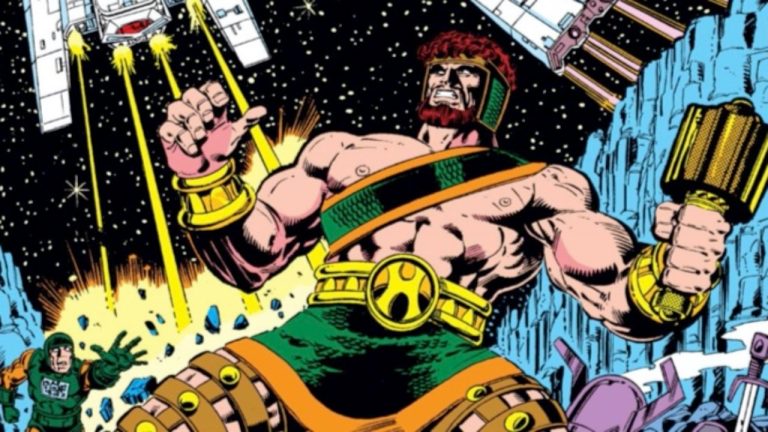Thor: Love and Thunder – What Brett Goldstein’s Hercules Means for the MCU
With the Mighty Hercules entering the MCU in Thor: Love and Thunder, superhero stories gain a much needed mythological makeover.

This article contains Thor: Love and Thunder spoilers.
The Prince of Power has arrived! In the final post-credit scene of Thor: Love and Thunder, a humiliated Zeus (Russell Crowe) plots his revenge against Thor and the other superheroes who take the worship due to gods. He sends them a god in the form of a hero with his son, Hercules, played by Ted Lasso’s Brett Goldstein. Love and Thunder doesn’t give us much about the new hero, as we hear Goldstein growl only one line.
But Hercules has a long history in the comics, which give us some indication of the character’s role in the MCU. Looking at his stories before and within Marvel Comics, we can see how Hercules could restore a sense of high adventure!
From Myth to Marvel
Hercules has existed long before the Marvel Universe, let alone the MCU. In ancient stories, Hercules is the son of Zeus and Alcemene (nonconsensual, which is pretty common for Zeus). Hercules is best known for his twelve labors, challenges that range from the fantastical (slaying a hydra and a terrible lion) to the mundane (cleaning a stable with 3000 cattle) to the not-so-comfortable (stealing the girdle of Hippolyta). While the specific characterization shifts across stories and storytellers, Hercules generally comes off as haughty, quick to fight for his own personal glory.
That attitude became Hercules’s most defining characteristic when he properly entered the Marvel Universe with 1963’s Journey Into Mystery Annual #1. “When Titans Clash!” by Stan Lee and Jack Kirby found the God of Thunder battling the Prince of Power when the former refused to let Thor cross an Olympian bridge before him. Hercules continued in this manner for his first few appearances, a pampered brute with a fragile ego, quick to challenge anyone over any perceived slight.
The Incredibly Lovable Hercules
But eventually, Hercules morphed into a lovable lunkhead and, eventually, a complex character whose good-natured love of adventure made him a valuable ally to heroes across the Marvel Universe. By 1967, Hercules had joined the Avengers, and has remained a regular fixture on the team ever since. In 1975, Herc became a founding member of the D-list team The Champions, alongside Ghost Rider, Black Widow, and X-Men Ice Man and Angel.
More recently, Hercules has been an ally to the Hulk and a member of the Guardians of the Galaxy. Hercules really came into his own under writers Greg Pak and Fred Van Lente, when the series The Incredible Hulk became The Incredible Hercules. Teamed with teenage super genius Amadeus Cho, Hercules became less an arrogant lout looking for fights and more a hero whose joi de vivre drove him toward adventure. When writer Al Ewing added Herc to his lineup of The Guardians of the Galaxy, he added a softer side to the character, as evidenced by his tender romance with hot-headed Kree warrior Noh-Varr.
None of these writers changed the fundamental aspects of Hercules. He’s still far from the smartest guy in the room, and he still refuses to back down from a fight. But he’s now become the jock you could never hate, the guy who always gets the boy or girl he wants (and Herc wants most boys and girls he encounters), but isn’t a jerk about it. He’s the muscle-bound beefcake who always has your back and wants to lift your spirits.
Mythologizing the MCU
If that description of Hercules rings a few bells, there’s a good reason. In his first few appearances, Chris Hemsworth played Thor much like his comic book predecessor, an arrogant god learning to be humble, given to epic speeches but not to timely quips. As Hemsworth’s comedic chops have developed, Thor has become a more jovial guy and even pretty dense, especially in Thor: Love and Thunder. In short, the movie Thor has become a lot like the comic book Hercules.
It’s hard to believe that Kevin Feige would cast Brett Goldstein and not ask him to do comedy, so certainly MCU Herc will be involved in some shenanigans. But it’s also unlikely that the MCU will have two god bros running around, which means that we may see Hercules become more like comic book Thor: regal, self-serious, and a bit too intense — not too far off from Goldstein’s beloved character Roy Kent.
In his brief speech in the Love and Thunder post-credit sequence, Zeus indicates that he’s only getting involved in the superhero game to draw attention back to the gods. This may be good news for fans who prefer the high space adventure of Thor: The Dark World over the constant snark of Thor: Ragnarok and Love and Thunder. While Taika Waititi has gotten a lot of mileage out of making fun of Asgardian space goats and giant fire gods, concepts that are inherently goofy, Jack Kirby, Walt Simonson, Jason Aaron, and others have gotten more out of celebrating the absurdities of Marvel mythology.
Should Hercules become for the MCU what Thor is in the comics, it will open space for both kinds of storytelling. Thor can continue his adventures in the sillier parts of the MCU, while Hercules can take those ridiculous aspects at face value, restoring a mythic sense of wonder to Marvel’s sometimes too quippy heroes.
